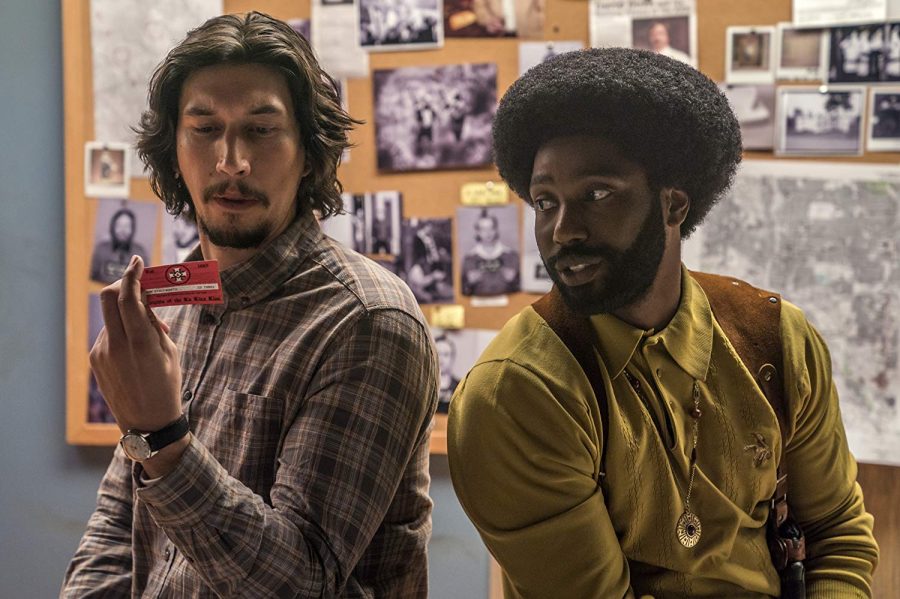Spike Lee makes a powerful political statement with BlacKkKlansman: a modern-day masterwork
Ron Stallworth (John David Washington) and Flip Zimmerman (Adam Driver) examine the Ku Klux Klan membership card they have earned.
September 4, 2018
Acclaimed writer/director Spike Lee has returned with his newest joint and he is back with a vengeance, for BlacKkKlansman is a force to be reckoned with. Lee’s film is a true story about a black man named Ron Stallworth (played by John David Washington) who infiltrates the Ku Klux Klan. Sound ridiculous? It is. This is a movie that, conceptually, shouldn’t work, but somehow it is one of the most enthralling, hilarious, and powerful films of the year.
When it comes to politics, Lee is no stranger: in BlacKkKlansman he takes many controversial issues head on such as police brutality, the state of the nation, and the potential racism of the current president. He takes on all of these issues magnificently in a 1970s setting, which furthermore enforces his point that not much has changed between then and now. One would think that a historical drama about the KKK would be an exploration into history, but that is not what the movie has in store. Lee wants to shine a mirror up to every American citizen and ask them, “Are you content with the current state of society?”
Despite all of the politics, Lee still crafts a thrilling and fun ride throughout, and actually makes this one of the funniest films of the past couple months. Much of that humor is executed so well because of Adam Driver (Kylo Ren in Star Wars: The Force Awakens and The Last Jedi), who plays the white man that physically appears in the form of Ron Stallworth at the Klan rallies. Driver is easily the standout in this film: he shows a spectrum of emotional depth, becomes one of the most likeable characters, and is at the center of the most complex and nail-biting scenes. Washington also shines as the lead role; he talks quite a bit like his all-too-famous father (Denzel), but also shows that he is an excellent actor in his own right.
One detail about BlacKkKlansman that I truly did not expect going in, was that I would get to know these Klan members. Lee portrays them not as truly evil people, but as normal citizens that just happen to have a severely misguided look at society. The film in no way supports these hateful people, but it takes the same approach that Ron Stallworth does when looking at the Klan: fascinated by what drives them and how they became to think the way they do.
The flaws this movie contains are quite minimal. Only small things stood out, such as a rally scene in the beginning that lasted about a minute too long (but it was so well shot that I didn’t mind), or the fact that I could, for the most part, tell which events were true and which weren’t (but the script was so well written that, again, I didn’t mind). The only outstanding flaw seemed to be that Stallworth himself was not given much background, but even this was pushed under the surface by the complexity of the events happening on screen.
BlacKkKlansman is important. Not everybody will agree with the political message it sends, but it is still one heck of a roller-coaster ride from beginning to end. It is funny, timely, well-acted, emotional, and a whole bunch of other qualities that Oscar voters should eat right up.
At the end of the movie, despite having laughed through the majority of it, nearly all of the audience in my theater was crying. That’s the type of impact that the message of BlacKkKlansman creates.
BlacKkKlansman is is in theaters everywhere now and it is rated R for language throughout, including racial epithets, and for disturbing/violent material and some sexual references.








Julie Duggan • Sep 4, 2018 at 8:33 pm
Joel, your well-written review describes the movie as I remember it, especially that it is funny, heartbreaking and a commentary about racism in the U.S. today.